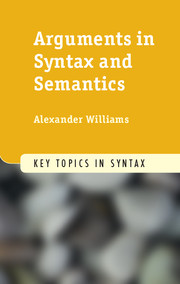Book contents
- Frontmatter
- Dedication
- Contents
- Acknowledgments
- List of abbreviations
- Introduction
- Part I Background
- Part II Kinds of arguments
- Part III Analysis of argument relations
- 6 Thematic relations
- 7 Agent and Patient
- 8 Role iteration
- 9 Separation
- 10 Event structure
- 11 Linking and framing
- Part IV Case studies
- Glossary
- References
- Index
9 - Separation
Published online by Cambridge University Press: 05 January 2015
- Frontmatter
- Dedication
- Contents
- Acknowledgments
- List of abbreviations
- Introduction
- Part I Background
- Part II Kinds of arguments
- Part III Analysis of argument relations
- 6 Thematic relations
- 7 Agent and Patient
- 8 Role iteration
- 9 Separation
- 10 Event structure
- 11 Linking and framing
- Part IV Case studies
- Glossary
- References
- Index
Summary
INTRODUCTION
Because of the verb sing, (1) entails that there was a singing. It also entails that Ozzy was the singer, due in part to whatever relation Rs is bound by Ozzy in (1)'s derivation.
(1) Ozzy sings.
But in that derivation, is Rs introduced by sing itself? Is Ozzy a content argument of the verb, besides naming the singer? The answers “Yes” and “No” define the projectionist and separationist approaches, respectively, and this distinction is our topic in this chapter.
Say that some R is an entailed relation for a predicate V, as Singer or Agent are for sing. On a projectionist treatment, a dependent that binds R is also a content argument of V, which lexically has a semantic argument in that relation. Suppose that the meaning of sing is (2a); or maybe it is (3a), with lexical decomposition.
(2) a sing ≅ λxλe[Singing By (e, x)]
b [Ozzy sing] ≅ ∃e[Singing By (e, Ozzy)]
(3) a sing ≅ λx∃e[Agent(e, x) & Singing(e)]
b [Ozzy sing] ≅ ∃e[Agent(e, Ozzy) & Singing(e)]
Combining sing with Ozzy by Application then yields (2b) or (3b). Either way, the relation that Ozzy binds, Singing By in (2b) or Agent in (3b), comes from the verb sing. It therefore has a projectionist account, relative to sing.
A separationist treatment is simply not projectionist. The relevant dependent is not a content argument of V. It does bind a relation R that is entailed by V, but R is introduced by some other part of the derivation, not by V itself. Suppose that (1) has the syntax in (4), where AG is a silent lexical item (Krifka 1992, Kratzer 1996). Suppose also that AG and sing have the values in (5) and (6).
(4) [[Ozzy AG] sing]
(5) [[AG]] = λxλe[Agent(e, x)]
(6) [[sing]] = λe[Singing((e)]
AG will combine with Ozzy by Application. The result will combine with sing by Conjunction to yield (3b) as the meaning for (4).
- Type
- Chapter
- Information
- Arguments in Syntax and Semantics , pp. 184 - 211Publisher: Cambridge University PressPrint publication year: 2015



